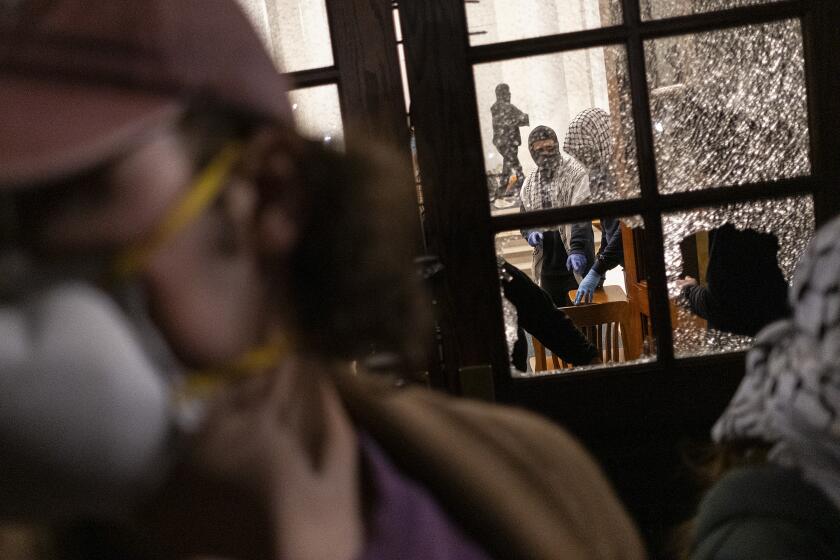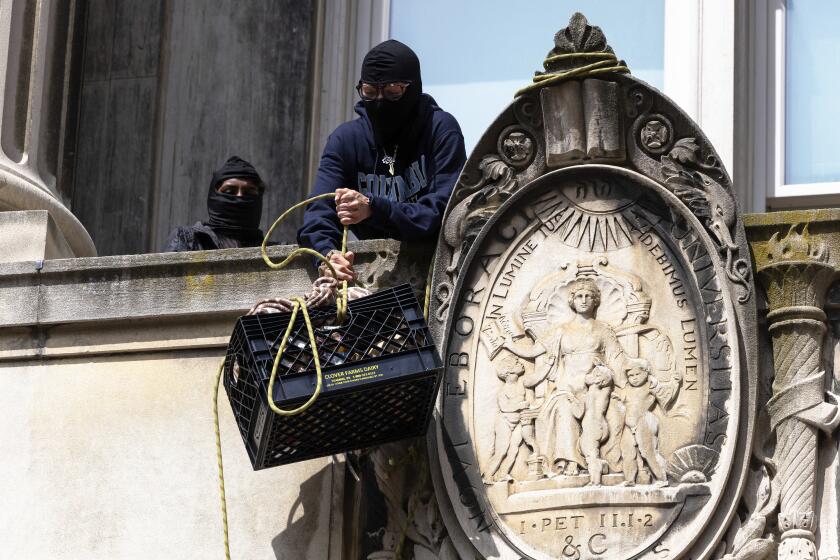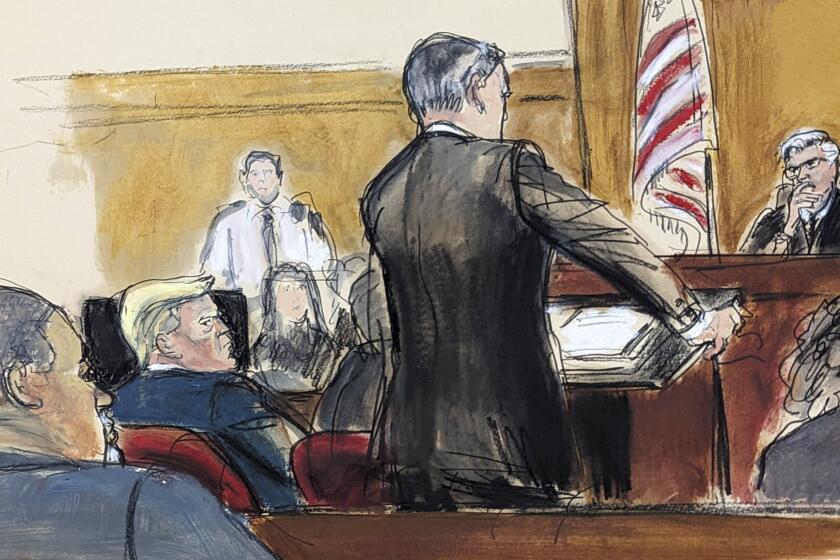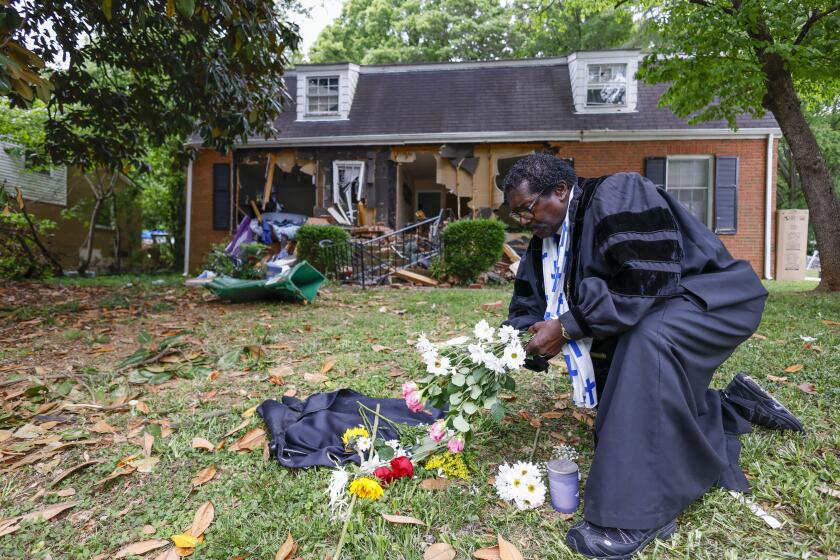Musharraf pledges to quit army
islamabad, pakistan -- A lawyer representing President Pervez Musharraf declared in court Tuesday that the general would give up his role as army chief -- but only after he has been reelected to another term as president.
The statement, the first official and public pledge by Musharraf to relinquish the military post that has been the mainstay of his power, apparently was intended to calm Pakistan’s political storm. But opponents immediately denounced it as too little, too late.
Opposition parties said they would press ahead with a legal bid to have Musharraf disqualified from standing for reelection by an electoral college made up of members of the outgoing provincial and national assemblies, which are dominated by allies of the president. The vote is scheduled to take place in early October.
A Supreme Court panel -- minus the chief justice, who recused himself after a bruising confrontation with Musharraf this year, when the general tried unsuccessfully to fire him -- is hearing half a dozen challenges to the Pakistani leader’s eligibility to claim another term in office.
Musharraf’s offer to step down as military chief after the presidential vote was delivered by government lawyer Sharifuddin Pirzada, who told the high court that “President Gen. Musharraf shall relinquish the office as chief of army staff soon after the election, but before taking the oath of office as president.”
The leader’s inauguration to a new term would take place on or shortly before Nov. 15.
Aides to the president had hinted Monday that such a pledge was in the offing, but analysts said it carried far greater weight coming in a legal forum.
Sweating in the sun outside the court building, a senior member of Musharraf’s political party predicted that the declaration would “lower the political temperature.”
“We are ready to move on. The country is ready to move on,” said Mushahid Hussain Sayed, the secretary-general of the ruling Pakistan Muslim League-Q party. “We have taken the steam out of [the opposition’s] arguments.”
Not so fast, said opponents, who expressed frank skepticism that the president would keep his promise.
“We have had plenty of experience with Gen. Musharraf in this regard,” said Liaqat Baloch, who represents an Islamist party that filed one of the court briefs demanding Musharraf’s disqualification.
The general, Baloch pointed out, had reneged on similar pledges made after the 1999 coup that brought him to power.
Another of the complainants, a lawyers association, called the statement a ruse meant to cloud court proceedings and ensure that Musharraf’s supporters do not bolt before he has secured a new five-year term.
“It’s a very clever statement,” said the group’s attorney, Muneer Malik.
“But consider the negative: The message is that if he is not elected, he will not give up the uniform.”
The general’s maneuver poses perhaps the thorniest challenge to the party of former Prime Minister Benazir Bhutto, who has been in talks for months with Musharraf’s camp about a power-sharing deal. She has demanded that he step down as military chief before standing for election.
Bhutto, who has lived in exile for eight years, is still seeking to clinch an accord with Musharraf, which her party says could help pave the way for a smooth transition to civilian rule. But the former prime minister, who has announced plans to return to Pakistan on Oct. 18, has already seen her prestige dented by association with the unpopular leader.
Perhaps mindful of that, her party issued a highly critical statement.
“This kind of bending of electoral rules and constitutional laws will trigger political instability in Pakistan, which the country can ill afford,” said party spokeswoman Sherry Rehman. “If Gen. Musharraf had thought of Pakistan first, he would have relinquished the post of army chief prior to seeking election from the present parliament.”
It is unclear whether Musharraf, who has continued to enjoy the backing of the Bush administration throughout his months-long faceoff with pro-democracy activists, will accept the court’s verdict if it disqualifies him.
The Pakistani leader could dissolve parliament and put off any elections, or declare emergency rule or martial law, which would involve drastic curtailment of Pakistanis’ civil liberties.
One possible pretext for the general to declare a state of emergency is the Islamist insurgency in the country’s tribal areas bordering Afghanistan, which has grown more intense in recent weeks. Government forces have suffered a series of setbacks in the fighting, including a mass surrender of more than 200 troops last month without a shot being fired.
Officials on Tuesday acknowledged the deaths of at least 15 soldiers, some of them elite commandos, in a confrontation a day earlier in North Waziristan, a focal point in the border fighting. U.S. intelligence reports have described the semi-autonomous region as a haven for Taliban and Al Qaeda leaders.
Reuters news agency quoted an intelligence official as saying that some of the dead soldiers had their throats cut.
Militants in the tribal region have been terrorizing civilians as they seek to impose a harsh Taliban-style social code, assassinating tribal elders who cooperate with the government, blowing up music stores and barbershops and beheading alleged prostitutes.
--
More to Read
Start your day right
Sign up for Essential California for news, features and recommendations from the L.A. Times and beyond in your inbox six days a week.
You may occasionally receive promotional content from the Los Angeles Times.






